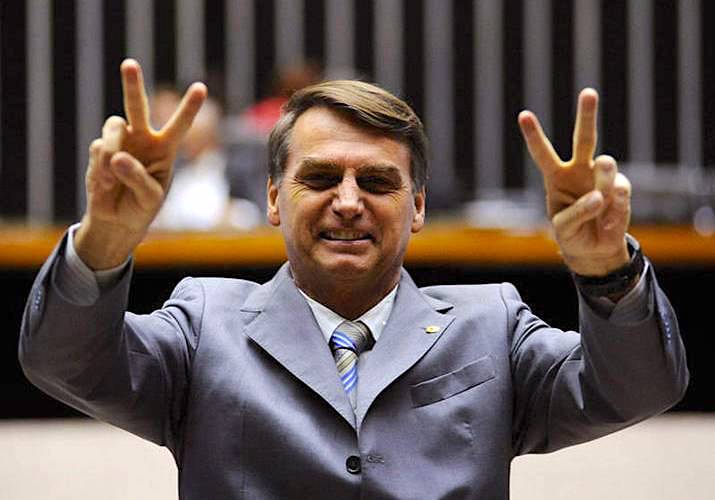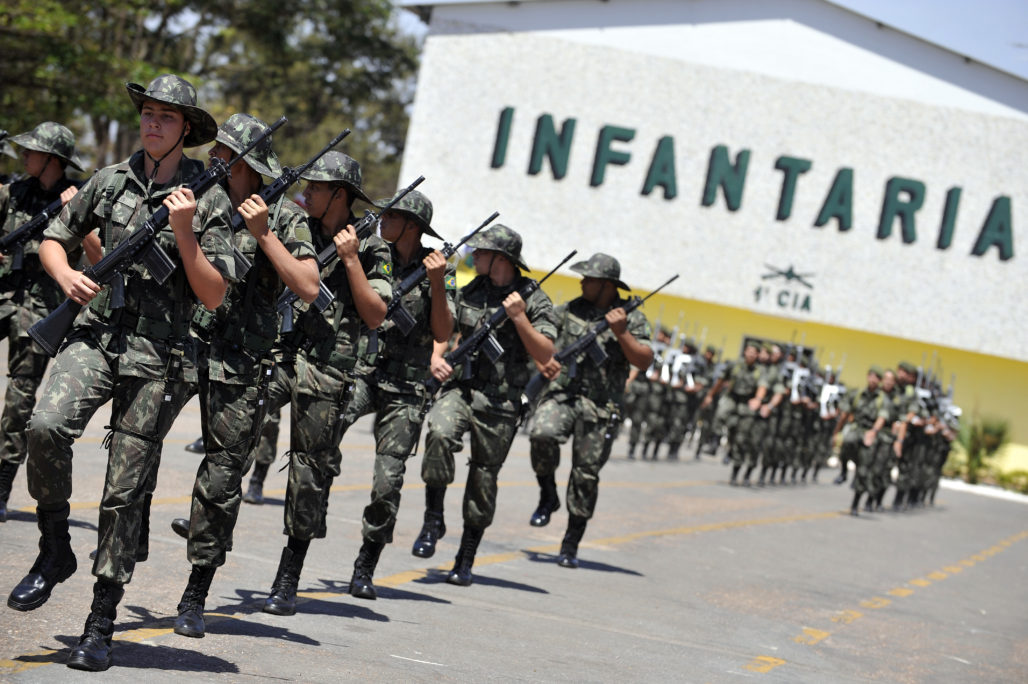consortiumnews(embedded links)Future of Western Democracy Being Played Out in BrazilOctober 9, 2018 • 46 Comments
Stripped to its essence, the Brazilian presidential elections represent a direct clash between democracy and an early 21st Century neofascism, indeed between civilization and barbarism, writes Pepe Escobar.By Pepe Escobarin Paris
Special to Consortium NewsNothing less than the future of politics across the West – and across the Global South – is being played out in Brazil.
Stripped to its essence, the Brazilian presidential elections represent a direct clash between democracy and an early 21st Century, neofascism, indeed between civilization and barbarism.
Geopolitical and global economic reverberations will be immense. The Brazilian dilemma illuminates all the contradictions surrounding the Right populist offensive across the West, juxtaposed to the inexorable collapse of the Left. The stakes could not be higher.
Jair Bolsonaro, an outright supporter of Brazilian military dictatorships of last century, who has been normalized as the “extreme-right candidate,” won the first round of the presidential elections on Sunday with more than 49 million votes. That was 46 percent of the total, just shy of a majority needed for an outright win. This in itself is a jaw-dropping development.
His opponent, Fernando Haddad of the Workers’ Party (PT), got only 31 million votes, or 29 percent of the total. He will now face Bolsonaro in a runoff on October 28. A Sisyphean task awaits Haddad: just to reach parity with Bolsonaro, he needs every single vote from those who supported the third and fourth-placed candidates, plus a substantial share of the almost 20 percent of votes considered null and void.
Meanwhile, no less than 69 percent of Brazilians, according to the latest polls, profess their support for democracy. That means 31 percent do not.
No Tropical TrumpDystopia Central does not even begin to qualify it. Progressive Brazilians are terrified of facing a mutant “Brazil” (the movie) cum Mad Max wasteland ravaged by evangelical fanatics, rapacious neoliberal casino capitalists and a rabid military bent on recreating a Dictatorship 2.0.
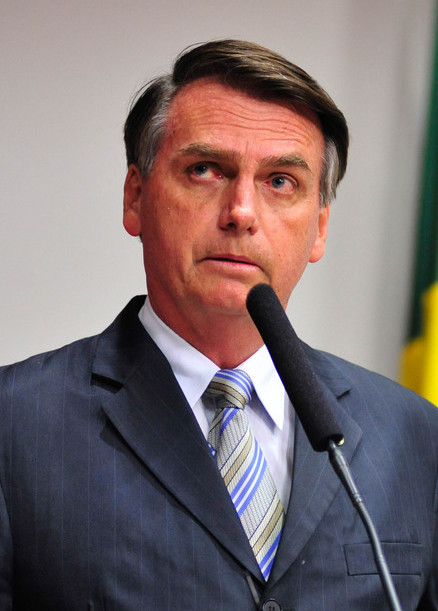 Bolsonaro: Danger for Brazil.
Bolsonaro: Danger for Brazil.Bolsonaro, a former paratrooper, is being depicted by Western mainstream media essentially as the Tropical Trump. The facts are way more complex.
Bolsonaro, a mediocre member of Congress for 27 years with no highlights on his C.V., indiscriminately demonizes blacks, the LGBT community, the Left as a whole, the environment “scam” and most of all, the poor. He’s avowedly pro-torture. He markets himself as a Messiah – a fatalistic avatar coming to “save” Brazil from all those “sins” above.
The Goddess of the Market, predictably, embraces him. “Investors” – those semi-divine entities – deem him good for “the market”, with his last-minute offensive in the polls mirroring a rally in the Brazilian real and the Sao Paulo stock exchange.
Bolsonaro may be your classic extreme-right “savior” in the Nazi mould. He may embody Right populism to the core. But he’s definitely not a “sovereignist” – the motto of choice in political debate across the West. His “sovereign” Brazil would be run more like a retro-military dictatorship totally subordinated to Washington’s whims.
Bolsonaro’s ticket is compounded by a barely literate, retired general as his running mate, a man who is ashamed of his mixed race background and is frankly pro-eugenics. General Antonio Hamilton Mourão has even revived the idea of a military coup.
Manipulating the ticket, we find massive economic interests, tied to mineral wealth, agro-business and most of all the Brazilian Bible Belt. It is complete with death squads against Native Brazilians, landless peasants and African-American communities. It is a haven for the weapons industry. Call it the apotheosis of tropical neo-pentecostal, Christian-Zionism.
Praise the LordBrazil has 42 million evangelicals – and over 200 representatives in both branches of Parliament. Don’t mess with their jihad. They know how to exercise massive appeal among the beggars at the neoliberal banquet. The Lula Left simply didn’t know how to seduce them.
So even with echoes of Mike Pence, Bolsonaro is the Brazilian Trump only to a certain extent: his communication skills – talking tough, simplistically, is language understandable to a seven-year old. Educated Italians compare him to Matteo Salvini, the Lega leader, now Minister of Interior. But that’s also not exactly the case.
Bolsonaro is a symptom of a much larger disease. He has only reached this level, a head-to-head in the second round against Lula’s candidate Haddad, because of a sophisticated, rolling, multi-stage, judicial/congressional/business/media Hybrid War unleashed on Brazil.
Way more complex than any color revolution, Hybrid War in Brazil featured a law-fare coup under cover of the Car Wash anti-corruption investigation. That led to the impeachment of President Dilma Rousseff and Lula being thrown in jail on corruption charges with no hard evidence or smoking gun.
In every poll Lula would win these elections hand down. The coup plotters managed to imprison him and prevent him from running. Lula’s right to run was highlighted by everyone from Pope Francis to the UN’s Human Rights Council, as well as Noam Chomsky. Yet in a delightful historical twist, the coup plotters’ scenario blew up in their faces as the front-runner to lead the country is not one of them, but a neofascist.
“One of them” would ideally be a faceless bureaucrat affiliated with the former social democrats, the PSDB, turned hardcore neoliberals addicted to posing as Center Left when they are the “acceptable” face of the neoliberal Right. Call them Brazilian Tony Blairs. Specific Brazilian contradictions, plus the advance of Right populism across the West, led to their downfall.
Even Wall Street and the City of London (which endorsed Hybrid War on Brazil after it was unleashed by NSA spying of oil giant Petrobras) have started entertaining second thoughts on supporting Bolsonaro for president of a BRICS nation, which is a leader of the Global South, and until a few years ago, was on its way to becoming the fifth largest economy in the world.
It all hangs on the “vote transfer” mechanism from Lula to Haddad and the creation of a serious, multi-party Progressive Democratic Front on the second round to defeat the rising neofascism. They have less than three weeks to pull it off.
The Bannon Effect Bannon: Danger for Europe.
Bannon: Danger for Europe.It’s no secret that Steve Bannon is advising the Bolsonaro campaign in Brazil. One of Bolsonaro’s sons, Eduardo, met with Bannon in New York two months ago after which the Bolsonaro camp decided to profit from Bannon’s supposed “peerless” social engineering insights.
Bolsonaro’s son tweeted at the time, “We’re certainly in touch to join forces, especially against Cultural Marxism.” That was followed by an army of bots disgorging an avalanche of fake news up to Election Day.
A specter haunts Europe. Its name is Steve Bannon. The specter has moved on to the tropics.
In Europe, Bannon is now poised to intervene like an angel of doom in a Tintoretto painting heralding the creation of a EU-wide Right Populist coalition.
Bannon is notoriously praised to high heavens by Italian Interior Minister Salvini; Hungarian Prime Minister Viktor Orban; Dutch nationalist Geert Wilders; and scourge of the Paris establishment, Marine Le Pen.
Last month, Bannon set up The Movement; at first sight just a political start-up in Brussels with a very small staff. But talk about Boundless Ambition: their aim is no less than turning the European parliamentary elections in May 2019 upside down.
The European parliament in Strasbourg – a bastion of bureaucratic inefficiency – is not exactly a household name across the EU. The parliament is barred from proposing legislation. Laws and budgets can only be blocked via a majority vote.
Bannon aims at capturing at least one-third of the seats in Strasbourg. He’s bound to apply tested American-style methods such as intensive polling, data analysis, and intensive social media campaigns – much the same as in Bolsonaro’s case. But there’s no guarantee it will work, of course.
The foundation stone of The Movement was arguably laid in two key meetings in early September set up by Bannon and his right-hand man, Mischael Modrikamen, chairman of the quite small Belgian Parti Populaire (PP). The first meeting was in Rome with Salvini and the second in Belgrade with Orban.
Modrikamen defines the concept as a “club” which will “collect funds from donors, in America and Europe, to make sure ‘populist’ ideas can be heard by the citizens of Europe who perceive more and more that Europe is not a democracy anymore.”
Modrikamen insists, “We are all sovereignists.” The Movement will hammer four themes that seem to form a consensus among disparate, EU-wide political parties: against “uncontrolled immigration”; against “Islamism”; favoring “security” across the EU; and supporting “a Europe of sovereign nations, proud of their identity.”
The Movement should really pick up speed after next month’s midterms in the U.S. In theory, it could congregate different parties from the same nation under its umbrella. That could be a very tall order, even taller than the fact key political actors already have divergent agendas.
Wilders wants to blow up the EU. Salvini and Orban want a weak EU but they don’t want to get rid of its institutions. Le Pen wants a EU reform followed by a “Frexit” referendum.
The only themes that unite this mixed Right Populism bag are nationalism, a fuzzy anti-establishment drive and a – quite popular – disgust with the EU’s overwhelming bureaucratic machine.
Here we find some common ground with Bolsonaro, who poses as a nationalist and as against the Brazilian political system – even though he’s been in Parliament for ages.
There’s no rational explanation for Bolsonaro’s last-minute surge among two sections of the Brazilian electorate that deeply despise him: women and the Northeast region, which has always been discriminated against by the wealthier South and Southeast.
Much like Cambridge Analytica in the 2016 U.S. election, Bolsonaro’s campaign targeted undecided voters in Northeastern states, as well as women voters, with a barrage of fake news demonizing Haddad and the Workers’ Party. It worked like a charm.
The Italian JobI’ve just been to northern Italy checking out how popular Salvini really is. Salvini defines the May 2019 European Parliament elections as “the last chance for Europe.” Italian Foreign Minister Enzo Moavero sees them as the first “real election for the future of Europe.” Bannon also sees the future of Europe being played in Italy.
It’s quite something to seize the conflicting energy in the air in Milan, where Salvini’s Lega is quite popular while at the same time Milan is a globalized city crammed with ultra-progressive pockets.
At a political debate about a book published by the Bruno Leoni Institute regarding exiting the euro, Roberto Maroni, a former governor of the powerful Lombardia region, remarked: “Italexit is outside of the formal agenda of the government, of the Lega and of the center-right.” Maroni should know, after all he was one of the Lega’s founders.
He hinted however that major changes are on the horizon. “To form a group in the European parliament, the numbers are important. This is the moment to show up with a unique symbol among parties of many nations.”
It’s not only Bannon and The Movement’s Modrikamen. Salvini, Le Pen and Orban are convinced they can win the 2019 elections – with the EU transformed into a “Union of European Nations.” This would include not just a couple of big cities where all the action is, with the rest reduced to fly over status. Right Populism argues that France, Italy, Spain, and Greece are no longer nations – only mere provinces.
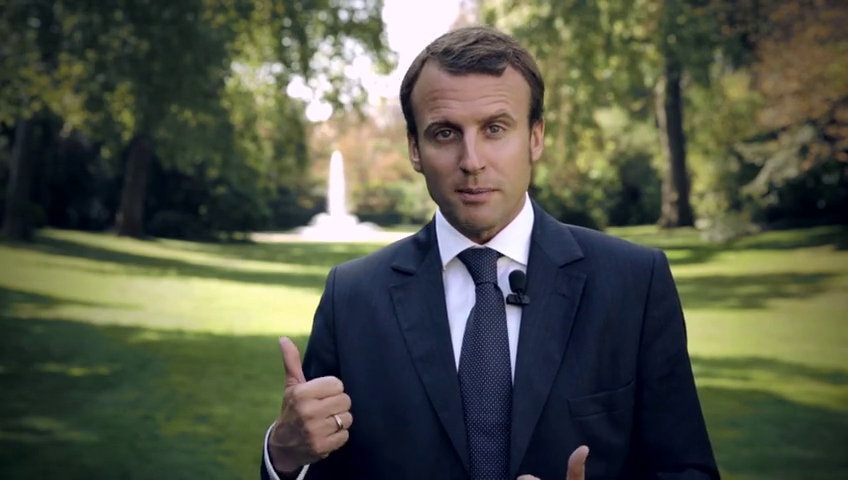 Macron: Perfect “progressive” wolf to be released among the sheep.
Macron: Perfect “progressive” wolf to be released among the sheep.Right Populism derives immense satisfaction that its main enemy is the self-described “Jupiter” Macron – mocked across France by some as the “Little Sun King.” President Emmanuel Macron must be terrified that Salvini is emerging as the “leading light” of European nationalists.
This is what Europe seems to be coming to: a trashy, Salvini vs. Macron cage match.
Arguably the Salvini vs. Macron fight in Europe might be replicated as Bolsonaro vs. Haddad in Brazil. Some sharp Brazilian minds are convinced Haddad is the Brazilian Macron.
In my view he is not. His has a background in philosophy and he’s a former, competent mayor of Sao Paulo, one of the most complex megalopolises on the planet. Macron is a Rothschild mergers and acquisitions banker. Unlike Macron, who was engineered by the French establishment as the perfect “progressive” wolf to be released among the sheep, Haddad embodies what’s left of really progressive Left.
On top of that – unlike virtually the whole Brazilian political spectrum – Haddad is not corrupt. He’d have to offer the requisite pound of flesh to the usual suspects if he wins of course. But he’s not out to be their puppet.
Compare Bolsonaro’s Trumpism, apparent in his last-minute message before Election Day: “Make Brazil Great Again,” with Trump’s Trumpism.
Bolsonaro’s tools are unmitigated praise of the Motherland; the Armed Forces; and the flag.
But Bolsonaro is not interested in defending Brazilian industry, jobs and culture. On the contrary. A graphic example is what happened in a Brazilian restaurant in Deerfield Beach, Florida, a year ago: Bolsonaro saluted the American flag and chanted “USA! USA!”
That’s undiluted MAGA – without a “B”.
Jason Stanley, professor of philosophy at Yale and author of
How Fascism Works, takes us further. Stanley stresses how “the idea in fascism is to destroy economic politics… The corporatists side with politicians who use fascist tactics because they are trying to divert people’s attention from the real forces that cause the genuine anxiety they feel.”
Bolsonaro has mastered these diversionist tactics. And he excels in demonizing so-called Cultural Marxism. Bolsonaro fits Stanley’s description as applied to the U.S.:
“Liberalism and Cultural Marxism destroyed our supremacy and destroyed this wonderful past where we ruled and our cultural traditions were the ones that dominated. And then it militarizes the feeling of nostalgia. All the anxiety and loss that people feel in their lives, say from the loss of their healthcare, the loss of their pensions, the loss of their stability, then gets rerouted into a sense that the real enemy is liberalism, which led to the loss of this mythic past.”
In the Brazilian case, the enemy is not liberalism but the Workers’ Party, derided by Bolsonaro as “a bunch of communists.” Celebrating his astonishing first round victory, he said Brazil was on the edge of a corrupt, communist “abyss” and could either choose a path of “prosperity, freedom, family” or “the path of Venezuela”.
The Car Wash investigation enshrined the myth that the Workers’ Party and the whole Left is corrupt (but not the Right). Bolsonaro overextended the myth: every minority and social class is a target – in his mind they are “communists” and “terrorists.”
Goebbels comes to mind – via his crucial text The Radicalization of Socialism, where he emphasized the necessity of portraying the center-left as Marxists and socialists because, as Stanley notes, “the middle class sees in Marxism not so much the subverter of national will, but mainly the thief of its property.”
That’s at the center of Bolsonaro’s strategy of demonizing the Workers Party – and the Left in general. The strategy of course is drenched in fake news – once again mirroring what Stanley writes about U.S. history: “The whole concept of empire is based on fake news. All of colonization is based on fake news.”
Right Against Left Populism?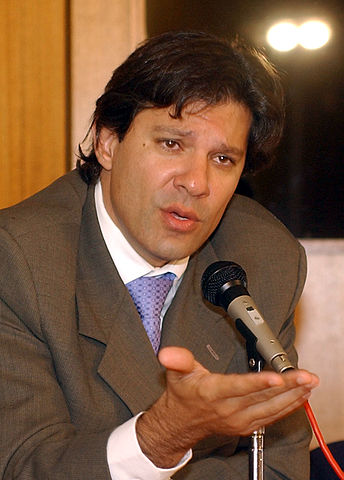 Haddad: Three weeks to head off Bolsonaro
Haddad: Three weeks to head off BolsonaroAs I wrote in a previous column, the Left in the West is like a deer caught in the headlights when it comes to fighting Right populism.
Sharp minds from Slavoj Zizek to Chantal Mouffe are trying to conceptualize an alternative – without being able to coin the definitive neologism. Left populism? Popularism? Ideally, that should be “democratic socialism” – but no one, in a post-ideology, post-truth environment, would dare utter the dreaded word.
The ascent of Right populism is a direct consequence of the emergence of a profound crisis of political representation all over the West; the politics of identity erected as a new mantra; and the overwhelming power of social media, which allows – in Umberto Eco’s peerless definition – the ascent of “the idiot of the village to the condition of Oracle.”
As we saw earlier, the central motto of Right populism in Europe is anti-immigration – a barely disguised variation of hate towards The Other. In Brazil the main theme, emphasized by Bolsonaro, is urban insecurity. He could be the Brazilian Rodrigo Duterte – or Duterte Harry: “Make my day, punk.”
He portrays himself as the Righteous Defender against a corrupt elite (even though he’s part of the elite); and his hatred of all things politically correct, feminism, homosexuality, multiculturalism – are all unpardonable offenses to his “family values.”
A Brazilian historian says the only way to oppose him is to “translate” to each sector of Brazilian society how Bolsonaro’s positions affect them: on “widespread weaponizing, discrimination, jobs, (and) taxes.” And it has to be done in less than three weeks.
Arguably the best book explaining the failure of the Left everywhere to deal with this toxic situation is Jean-Claude Michea’s Le Loup dans la Bergerie – The Wolf Among the Sheep – published in France a few days ago.
Michea shows concisely how the deep contradictions of liberalism since the 18th century – political, economic and cultural – led it to TURN AGAINST ITSELF and be cut off from the initial spirit of tolerance (Adam Smith, David Hume, Montesquieu). That’s why we are deep inside post-democratic capitalism.
Euphemistically called “the international community” by Western mainstream media, the elites, who have been confronted since 2008 with “the growing difficulties faced by the process of globalized accumulation of capital,” now seem ready to do anything to keep its privileges.
Michea is right that the most dangerous enemy of civilization – and even Life on Earth – is the blind dynamics of endless accumulation of capital. We know where this neoliberal Brave New World is taking us.
The only counterpunch is an autonomous, popular movement “that would not be submitted to the ideological and cultural hegemony of ‘progressive’ movements that for over three decades defend only the cultural interests of the new middle classes around the world,” Michae says.
For now, such a movement rests in the realm of Utopia. What’s left is to try to remedy a coming dystopia – such as backing a real Progressive Democratic Front to block a Bolsonaro Brazil.
One of the highlights of my Italian sojourn was a meeting with Rolf Petri, Professor of Contemporary History at the Ca Foscari University in Venice, and author of the absolutely essential A Short History of Western Ideology: A Critical Account.
Ranging from religion, race and colonialism, to the Enlightenment project of “civilization”, Petri weaves a devastating tapestry of how “the imagined geography of a ‘continent’ that was not even a continent offered a platform for the affirmation of European superiority and the civilizing mission of Europe.”
During a long dinner in a small Venetian trattoria away from the galloping selfie hordes, Petri observed how Salvini – a middle-class small entrepreneur – craftily found out how to channel a deep unconscious longing for a mythical harmonious Europe that won’t be coming back, much as petty bourgeois Bolsonaro evokes a mythical return to the “Brazilian miracle” during the 1964-1985 military dictatorship.
Every sentient being knows that the U.S. has been plunged into extreme inequality “supervised” by a ruthless plutocracy. U.S. workers will continue to be royally screwed as are French workers under “liberal” Macron. So would Brazilian workers under Bolsonaro. To borrow then from Yeats, what rough beast, in this darkest hour, slouches towards freedom to be born?
https://consortiumnews.com/2018/10/09/f ... in-brazil/ 






 And they got nukes ...
And they got nukes ...